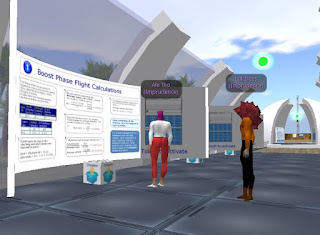Free space for Educators from ImageLearning
 if you are a virtual world education and would like some free space for classes then ImageLearning are about to be making several locations available for educational groups looking for unique spaces to gather for discussion. Any locations will they say be be "as is", in that ImageLearning will simply be providing a virtual space in the first instance it seems. This very generous offer has been made possible by the fact that not all of the current spce owned by them is currently used, though I guess this may change so I would recommend getting in quick on this one, and of course I am certain that any donations would be appreciated.
if you are a virtual world education and would like some free space for classes then ImageLearning are about to be making several locations available for educational groups looking for unique spaces to gather for discussion. Any locations will they say be be "as is", in that ImageLearning will simply be providing a virtual space in the first instance it seems. This very generous offer has been made possible by the fact that not all of the current spce owned by them is currently used, though I guess this may change so I would recommend getting in quick on this one, and of course I am certain that any donations would be appreciated.
I have copied below some of their suggestions that you may find useful:
A traditional, formal amphitheater.
A cinema.
A legal courtroom.
A stone church sanctuary.
An airport lobby.
Meeting rooms in a fire station and police station.
Hospital ER, Physician's Office and Morgue.
Warehouse.
Television studio with multiple sets.
Hibachi Restaurant.
60's Diner.
"Old Time" School Classroom.
Pizza Parlor.
Rustic Beach Bar.
Small Beach Cabins.
Large Beach with surf and sand.
Undersea area for diving.
Small Old Mansion on the Sea.
Deepwater Fishing Trawler, for small groups.
Onboard a jetliner at 30,000ft.
SciFi Locations Aboard the Starship Imagine
Dining Room/Mess.
Flight Deck.
Formal Briefing Room.
Bridge Conference Room.
For that "unique" experience:
A sinking ship.
A burning building.
A haunted psych ward.
Coming Soon: Medieval Village.
ImageLearning also say that "We are developing several new spaces of various kinds, and will make many of those available as we are able." So if you are interested then teleport over to
http://slurl.com/secondlife/imagiLEARNING/140/131/28/
If have questions, feel free to contact John Jamison, PhD.via email
john@imagilearning.com or Virtual Bacon in-world
through email, or leave a message in-world for Virtual Bacon.











